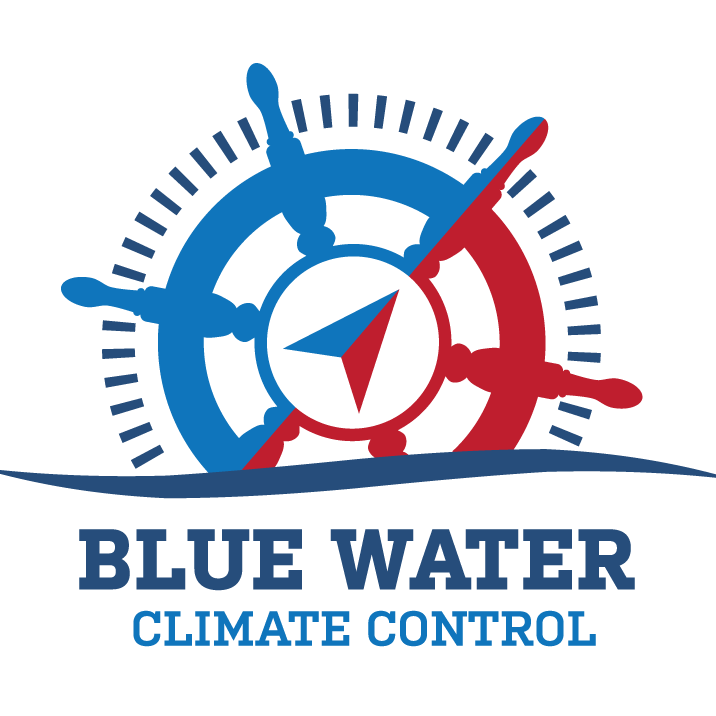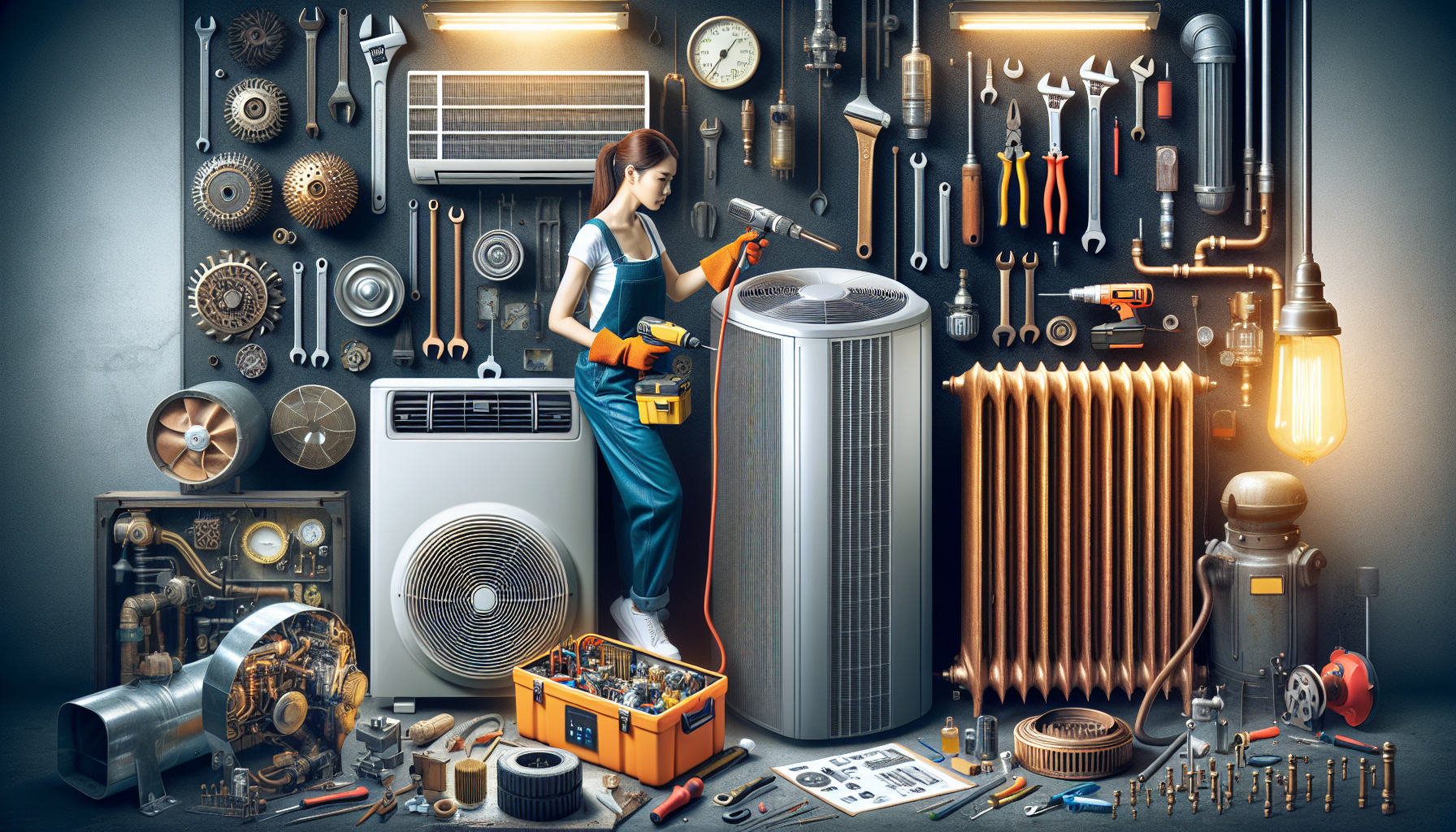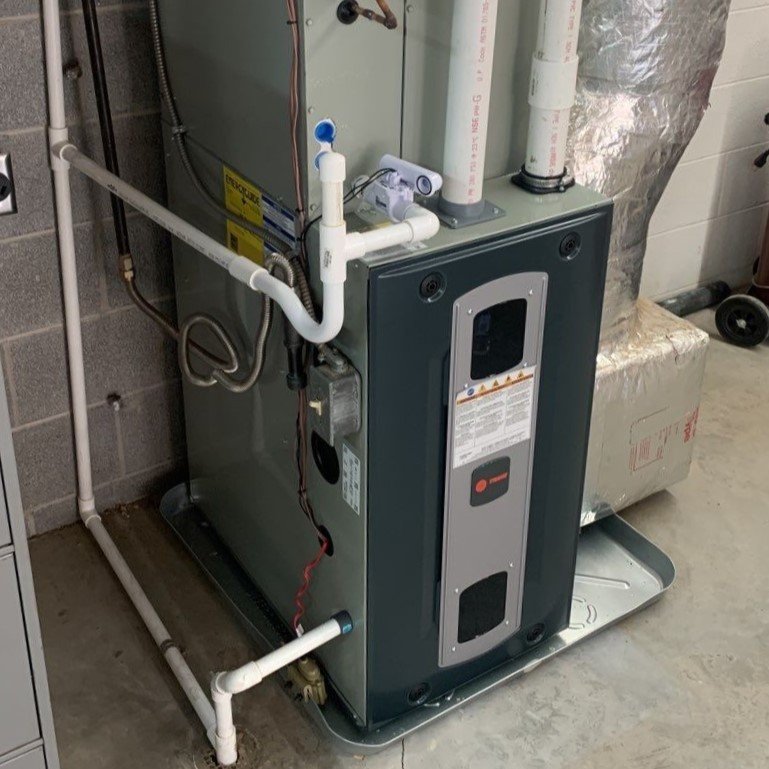HVAC Maintenance and Repair Services: Your Ultimate Guide
Have you ever struggled to understand the complexities of your home’s Heating, Ventilation, and Air Conditioning (HVAC) system? Maybe you’re unsure about the difference between an air conditioner and a heat pump, or perhaps scheduling regular maintenance feels overwhelming. This comprehensive guide will illuminate the intricacies of HVAC systems and services, offering a clear understanding of keeping your system in peak condition while ensuring optimal comfort and efficiency.
Key Takeaways
HVAC systems provide comprehensive heating and cooling solutions for residential and commercial spaces.
Professional HVAC companies offer various services to ensure optimal performance, efficiency, and equipment lifespan.
Smart thermostats, preventive maintenance measures, and air sealing/insulation improvements can help reduce energy costs while maintaining comfortable home conditions.
Understanding HVAC Systems and Services
HVAC, an abbreviation for Heating, Ventilation, and Air Conditioning, represents a system of interconnected parts that regulate heating and cooling in residential and commercial spaces. From the heat of summer to the chill of winter, air conditioning systems ensure that indoor temperatures remain comfortable throughout the year.
Types of HVAC Equipment
HVAC equipment is diverse, offering a range of systems designed to meet different needs and preferences. Some examples include:
Furnace & Air Conditioner
Ductless Mini-Split
Heat Pump
Geothermal System
Radiant Heating System
Each system offers its unique benefits and features.
For instance, a furnace provides efficient heating through the combustion of fuel, while an electric heat pump can both heat and cool a space by manipulating heat energy in the air or ground. Each HVAC system has specializations, and choosing the right one for your needs can significantly enhance your home’s comfort and energy efficiency.
Common HVAC Services Explained
To ensure these complex systems run smoothly, professional HVAC companies offer various services, including HVAC service. These include but are not limited to heating and cooling system repairs, HVAC installation and support, essential HVAC maintenance services, and air conditioning services.
Utilizing these services allows homeowners to keep their air conditioning systems running at their best, prolonging the equipment’s lifespan and reducing energy bills.
Selecting the Right HVAC System
Choosing an appropriate HVAC system isn’t just about picking the priciest model or the one with the most features. Factors to consider include:
Cost
Installation and maintenance needs
Noise level
Warranty
Unit size
Energy efficiency
Durability
After all, the right HVAC system best fits your needs and budget, ensuring comfort and efficiency without breaking the bank.
The Difference Between Air Conditioners and Heat Pumps
Understanding the difference between air conditioners and heat pumps is crucial for homeowners looking to maintain a comfortable home climate. Air conditioners are designed to cool indoor spaces by extracting warm air from the inside and releasing it outdoors. They are highly efficient in warmer climates and famous for cooling. On the other hand, heat pumps offer a more versatile solution. Not only do they function similarly to air conditioners by providing cool air during hot months, but they can also reverse the process to supply warm air during more relaxed times. This dual functionality makes heat pumps an all-in-one system for managing indoor temperatures year-round. Both systems are valuable for creating a comfortable indoor environment, but choosing between an air conditioner and a heat pump will depend on your specific needs for warm or cool air, energy efficiency, and climate.
The design differences between air conditioners and heat pumps are pivotal in understanding their functionality. Air conditioners consist of an indoor evaporator coil and an outdoor condenser unit, working together to remove heat from the air inside your home. In contrast, heat pumps have a reversible valve to switch between heating and cooling modes. While in cooling mode, a heat pump mirrors the air conditioner's process, but in heating mode, it reverses the refrigerant flow to extract heat from the outdoor air and transfer it inside. This versatility is a crucial design feature distinguishing heat pumps from traditional air conditioners. Additionally, the efficiency of heat pumps in mild climates can lead to energy savings, making them a compelling choice for those seeking a year-round temperature control solution. Both systems are engineered with advanced technologies to provide optimal comfort but differ significantly in their approach to heating and cooling your home.
Premier HVAC Contractors and Their Offerings
The HVAC industry in Knoxville is teeming with premier contractors, each offering a unique set of services to ensure your heating and air conditioning system is up to par. These contractors provide standard heating and cooling services and specialized services that cater to modern needs and technologies.
We will examine some of these services and their impact on your HVAC system's overall performance and lifespan.
Emergency Services Availability
HVAC emergencies can happen unexpectedly, and having a dependable contractor for immediate help is important. Most premier HVAC contractors in Knoxville offer 24-hour emergency services, ensuring that help is just a call away, regardless of the time or day.
Such availability gives homeowners peace of mind and helps prevent minor issues from escalating into costly repairs or replacements.
Commitment to Energy Efficiency
With growing awareness of environmental sustainability, many HVAC contractors are committed to offering energy-efficient services. These include:
Providing energy-efficient HVAC systems
Performing energy audits
Offering energy-efficient upgrades
Educating customers about energy-saving practices
This commitment helps homeowners save on energy bills and contributes to a more sustainable future.
Licensed and Skilled Technicians
The backbone of any reputable HVAC contractor is their team of licensed and skilled HVAC technicians. These professionals possess the necessary expertise and knowledge to diagnose and repair any HVAC system accurately. With their help, you can rest assured that your HVAC system is in good hands and will operate at its best, ensuring optimum comfort and efficiency.
HVAC Installation and Replacement Insights
Understanding the process and its requirements is critical when installing a new HVAC system or replacing an old one. This section will provide insights into HVAC installation and replacement, guiding you through the steps and helping you make informed decisions.
Steps in Professional HVAC Installation
Professional HVAC installation is a detailed and multi-step process. These steps include:
Analyzing the system’s requirements
Accurately sizing the new system
Evaluating and upgrading existing ductwork
Installing the new system
A professional air conditioning installation ensures the HVAC system operates optimally and efficiently, providing maximum comfort and energy savings.
When to Consider a New Unit
Knowing when to replace your HVAC unit can take time and effort. Factors such as the system’s age and performance, as well as the frequency and cost of repairs, can influence this decision.
Investing in a new, more efficient unit can be more cost-effective over time than constantly repairing an older, less efficient one.
Financing Options for HVAC Investment
Investing in a new HVAC system can be a significant expense. However, several financing options are available to ease this burden. These include:
Personal loans
Home equity loans or lines of credit
Credit cards
HVAC company financing
Government assistance programs
By exploring these options, homeowners can make the investment more manageable and enjoy the benefits of a new HVAC system without straining their finances.
HVAC Maintenance: Keeping Your System in Top Shape
Appropriate maintenance is the secret to maintaining a highly functioning HVAC system. Regular check-ups and cleaning can help prevent major repairs, extend the lifespan of your system, and ensure optimal performance. This section will underscore the importance of HVAC maintenance and provide tips for maintaining optimal system performance.
Routine Check-ups and Cleaning
Routine check-ups and cleaning are integral to the longevity and efficiency of your HVAC system. Having your system inspected and cleaned at least once a year can help prevent minor issues from escalating into costly repairs, ensuring that your HVAC system remains in optimal condition for longer.
Detecting and Addressing Cooling Issues
Detecting and addressing cooling issues early can prevent more significant problems. Signs such as reduced airflow, warm air from vents, and increased humidity can indicate cooling problems that need immediate attention.
By understanding these signs and responding promptly, homeowners can ensure that their heating and cooling equipment remains efficient and effective, delivering optimal comfort throughout the year.
Extending Your HVAC System's Lifespan
A well-maintained HVAC system delivers optimal comfort and efficiency and lasts longer. By implementing preventive measures such as regularly changing air filters, maintaining proper airflow, and scheduling regular maintenance, homeowners can extend the lifespan of their HVAC systems, saving money on replacements and repairs in the long run.
Indoor Air Quality Solutions
Maintaining good indoor air quality (IAQ) is essential for comfort and health. High-quality indoor air can reduce allergies, improve sleep, and enhance mood.
This section will discuss various solutions for enhancing IAQ, including clean air ducts, advanced filtration options, and humidity control.
Importance of Clean Air Ducts
Clean air ducts are essential for maintaining good IAQ. Dust, allergens, and other pollutants that accumulate in the ducts can be circulated throughout your home, negatively affecting the air you breathe.
Regular cleaning of air ducts can significantly improve IAQ, creating a healthier and more comfortable environment for you and your family.
Advanced Filtration and Purification Options
Advanced filtration and purification systems can further enhance IAQ. These systems are designed to capture and eliminate a broad range of pollutants, including:
dust
pollen
pet dander
bacteria
viruses
Advanced filtration and purification systems can eliminate these contaminants, delivering cleaner, healthier air and improving the overall indoor environment.
Humidity Control for Comfort and Health
Humidity control is another crucial aspect of IAQ. Excessive humidity can promote the growth of mold and dust mites, while too little moisture can cause dry skin and respiratory problems.
Homeowners can enhance comfort and health by maintaining optimal humidity levels, creating a more pleasant indoor environment.
Signs You Need HVAC Repair or Replacement
Like all systems, HVAC systems can also develop issues over time. Knowing the signs that indicate the need for repair or replacement can help you take timely action and prevent minor issues from escalating. This section will cover these signs and guide you through responding appropriately.
Recognizing Warning Signals
Warning signals such as abnormal sounds, unpleasant odors, and unusually high energy bills can all indicate potential issues with your air conditioning equipment. By recognizing these signals early, you can seek professional help and address the issue before it worsens, preventing costly repairs or replacements.
Responding to HVAC Emergencies
In an HVAC emergency, immediate action is essential. Turn off the system to prevent further damage and contact a reliable HVAC professional who can provide prompt assistance.
Timely response to HVAC emergencies can minimize damage, ensure the safety of your home, and restore your system to optimal functioning as quickly as possible with emergency repairs.
Cost Implications of Delayed Repairs
Delaying HVAC repairs can lead to higher costs in the long run. If addressed, minor issues can escalate into major problems, requiring more extensive repairs or system replacement.
Regular maintenance and prompt repairs, including air conditioning repair, can help you avoid these costs and ensure that your HVAC system remains in good condition and operates efficiently.
Saving on HVAC Costs Without Sacrificing Comfort
As energy costs rise, it becomes increasingly important to find ways to reduce HVAC costs without compromising comfort. This section will offer tips on achieving this balance, including using smart thermostats, implementing preventive measures, and improving air sealing and insulation.
Smart Thermostats and Energy Bills
Smart thermostats play a game-changing role in decreasing energy bills while ensuring comfort. These devices learn your schedule and preferences, automatically adjusting the temperature for optimal comfort and efficiency.
By reducing wasteful practices and optimizing energy usage, smart thermostats can help you save significantly on your energy bills.
Preventive Measures and Regular Maintenance
Preventive actions, including regular maintenance, can also help save on HVAC costs. Regular check-ups and cleaning can help prevent major repairs, extend the lifespan of your system, and ensure optimal performance.
By investing in regular maintenance, you can ensure that your heating and cooling equipment remains efficient and effective, saving on replacement and repair costs in the long run.
Air Sealing and Insulation Improvements
Improving air sealing and insulation can also contribute to HVAC cost savings. Air leakage can lead to significant energy loss, while poor insulation can result in heat loss during winter and heat gain during summer.
By addressing these issues, homeowners can reduce their HVAC costs while improving comfort and efficiency.
Summary
From understanding the intricacies of HVAC systems and services to recognizing the signs of HVAC problems, this guide has covered various topics to help you navigate the HVAC world. With regular maintenance, innovative use of advanced features, and prompt response to issues, you can ensure that your air conditioning systems remain in top condition, delivering optimal comfort and efficiency. Remember, maintaining your HVAC system is an investment in your home and comfort. So, take the time to understand your system, and don’t hesitate to seek professional help.
Frequently Asked Questions
What does HVAC mean?
HVAC is an acronym for Heating, Ventilation, and Air Conditioning. It refers to the systems used to heat and cool residential and commercial buildings, improve indoor air quality, and move air between indoor and outdoor areas.
What is the difference between AC and HVAC?
AC stands for air conditioning, while HVAC refers to heating, ventilation, and air conditioning. AC refers to systems designed specifically to cool the air in a home, whereas HVAC also considers heating and ventilation.
Why is HVAC so expensive?
Higher manufacturing costs and disruptions to the supply chain due to COVID-19 have contributed to the high prices of HVAC systems.
How much does it cost to install a cooling system in a house?
Installing a cooling system in your home can cost between $2,500 and $12,500, depending on factors like the size and layout of the house, the reusability of the ductwork, the system's energy efficiency, and project complexity.
What is the role of HVAC systems?
HVAC systems, consisting of interconnected components that work together, play an essential role in providing regulated heating and cooling for both residential and commercial spaces.








